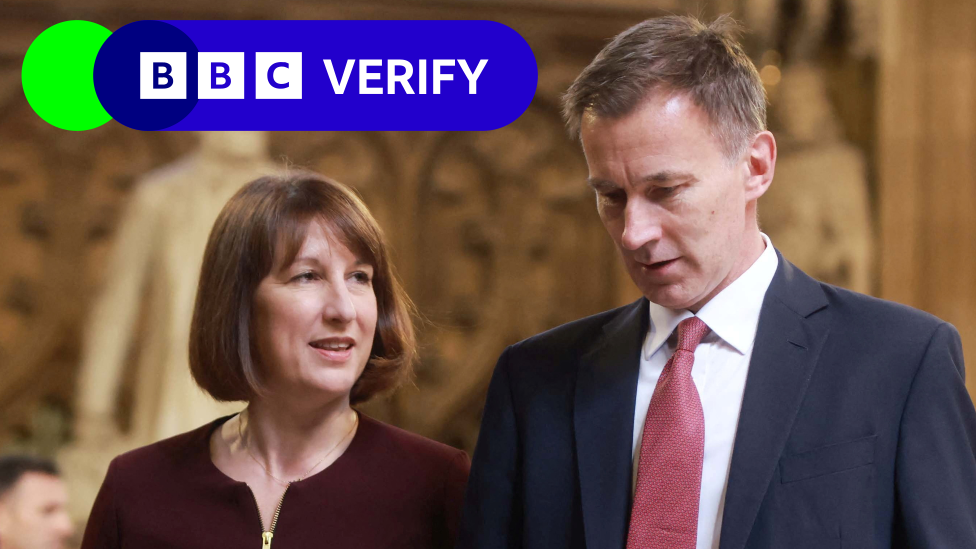Reeves and Hunt's claims about shortfalls checked

- Published
The chancellor and shadow chancellor gave interviews on Tuesday morning, the day after Rachel Reeves blamed the previous Conservative government for leaving a £22bn shortfall in the public finances.
They criticised each other and made a series of claims.
We’ve looked at some of them.
'I think it's inconceivable that the pressures on public finances weren't shared' - Jeremy Hunt
The shadow chancellor Jeremy Hunt has spoken repeatedly about how the chancellor should have known about the state of the public finances.
He says that's because she had access to the independent Office for Budget Responsibility's (OBR) judgements from the time of the March Budget and was also entitled to ask questions to the Treasury's most senior civil servant.
"Those public finances were audited by the OBR just 10 weeks before the election was called," Mr Hunt told MPs on Monday.
But the head of the OBR wrote a letter on Tuesday, external saying that he had only been made aware of some of the pressures last week.
He's so worried about it that he has set up a review to assess the information provided to the OBR by the Treasury ahead of the Budget.
'Bean counters' get their revenge, as Reeves unveils spending audit
- Published29 July 2024
Reeves defends move to restrict winter fuel payments
- Published30 July 2024
“It would be almost unprecedented to reject the recommendations of the independent pay review bodies” Rachel Reeves
Defending her decision to accept the pay review bodies’ recommendations on pay rises for public sector workers, Rachel Reeves told the Today programme on BBC Radio 4 that it would be “almost unprecedented” to reject them.
Pay review bodies (PRBs) make recommendations on pay for public-sector workers such as teachers, nurses, doctors, police officers and members of the armed forces.
They take evidence from relevant government departments, as well as unions and expert organisations, before they say how pay should change each year.
There are, however, government-set constraints that the PRBs have to take into consideration when making their recommendations.
It is true that the government usually accepts the recommendations (although they are not legally binding) but it is not that unusual for the government to reject some of the recommendations.
For example, Jeremy Hunt when he was health secretary, rejected the 2014 PRB recommendation for a pay rise of 1% for all doctors and dentists, external.
There are other recent examples – in 2018 and 2022 - when the government rejected certain parts of some of the recommendations, according to the independent Institute for Government think tank, external.
'She finds 22% - 10 times inflation - to pay junior doctors - nearly three times inflation for every other public sector worker' - Jeremy Hunt
The offer that the British Medical Association is putting to its members is worth about 22%, but that is over two years.
There would be a 4% backdated pay rise for 2023-24, on top of the existing increase worth an average of 9%.
Then a further pay rise worth about 8% is being offered for 2024-25, as recommended by an independent pay review body.
As it is over two years, it is not correct to say that it is 10 times the rate of inflation, which was 5.7% in 2023-24 and is expected by the OBR to be another 1.6% in the following year.
As for it being three times what other public sector workers were getting, the Treasury says, external that the average award was 6% in 2023-24 and is expected to be between 5% and 6% in the current year. The junior doctors are not getting three times that much.
Junior doctors offered 22% pay rise in deal to end strike action
- Published29 July 2024
Public sector 'pay has fallen behind private sector pay this last decade' - Rachel Reeves
The chancellor was talking about why she had accepted the pay review bodies' recommendation to give public sector workers pay rises above the rate of inflation.
Comparing public and private sector pay is complicated by things like the need to adjust for levels of qualifications and whether you include bonuses or pensions.
If you look just at the average levels of pay, external, between 2015 and 2019 there was a post-financial crisis recovery in private sector pay that was not matched in the public sector.
During the pandemic public sector outperformed private sector, because the furlough scheme meant many private sector workers were earning 80% of their usual pay.
Since the pandemic private sector pay has significantly outperformed public sector, responding more to the high rates of inflation seen in recent years.
But it should be remembered that both have been unusually poor in recent years.
The Institute for Fiscal Studies think tank points out that average pay in the public sector adjusted for rising prices at the end of 2023 was still 1% lower than it had been at the start of 2007, while the comparable figure for the private sector was only up 4%.
Additional reporting by Gerry Georgieva and Lucy Gilder
